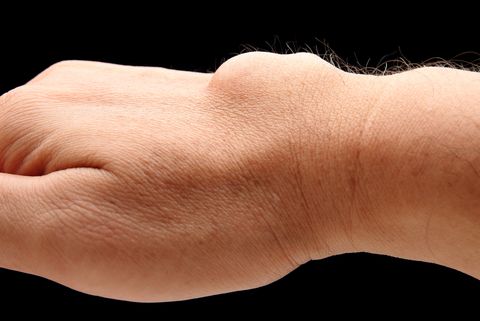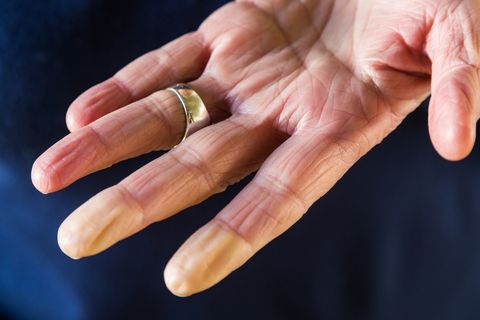Hand Continues to Be Numb After Painting
This article was medically reviewed by Rekha Kumar, MD, an assistant professor of medicine and member of the Prevention Medical Review Board, on July 10, 2019.
Your hands contain some of the most sensitive touch receptors in your entire body, and all of those touch receptors are connected to your brain by a network of nerves.
If even one of those nerves—or one section of those nerves—is pinched or somehow damaged, your brain may not receive all the sensory info your hands are sending its way. The result? Uncomfortable numbness or tingling sensations, says Rob Danoff, DO, director of family medicine at Philadelphia's Aria Health System.
More From Prevention

However, there are so many different things that can cause your hands to go numb. From overuse injuries to infections to chronic health conditions, here's why your hands may feel that tingling feeling—or nothing at all.
1. Tennis Elbow
If you're a tennis player of golfer—or partake in any activity that requires repetitive twisting of the hand, wrist, or elbow—you're at risk for epicondylitis, or tennis elbow, Dr. Danoff says. This condition stems from the wearing down or weakening of tendons that wrap across your elbow, according to the American Society for Surgery of the Hand (ASSH).
While full-blown tennis elbow tends to manifest as pain in your elbow or forearm, early signs are tingling and numbness in your hands. If you experience either, take a break from the offending sport or activity for a bit. If it comes back, let your doctor know about it.
2. Carpal Tunnel Syndrome
Dr. Danoff says one of the most common causes of hand numbness is carpal tunnel syndrome—a condition in which the median nerve, which runs down your forearm and into your hand, becomes pinched at your wrist.
"It's fairly common for people who spend a lot of time working on a computer," he says. Especially if your desk setup requires you to lay your wrist against an edge or hard surface while you're typing or using a mouse, you're at risk.
Along with numbness, symptoms of carpal tunnel include a sensation that one or more of your fingers—especially your thumb, index, and middle finger—are swollen or tingling, according to the National Institute of Neurological Disorders and Stroke (NNDS). If these symptoms describe what you're feeling, let your doctor know ASAP, Dr. Danoff says. If left untreated too long, you may need surgery to relieve your pinched nerve.
It's also important to note that when carpel tunnel syndrome occurs in both hands, it may be a manifestation of another disease. For example, rheumatoid arthritis, an autoimmune disease that attacks the joints, can also be associated with carpal tunnel syndrome.
3. Thyroid Disorders
"It may not be the first thing that comes to mind, but a thyroid disorder could lead to hand numbness," Dr. Danoff says. Your thyroid is the butterfly-shaped gland that sits below your Adam's apple, and it's responsible for a variety of processes in your body.
When left undiagnosed and untreated, an underactive thyroid—aka hypothyroidism—can result in damage to the nerves that transport information between your brain and spinal cord and the rest of your body. That's because your thyroid gland isn't pumping out enough crucial hormones for these functions.
Especially if you're experiencing other symptoms of an underactive thyroid—such as hair loss, weight gain, and feeling cold all the time—it's time to talk with your physician.
4. Medications
Certain medications can cause numbness, abnormal sensations, and tingling in the hands and feet as a common side effect. The most common include chemotherapy drugs or HIV/AIDS treatments.
But other common medications, such as anti-alcohol drugs, heart or blood pressure meds, infection-fighters, and skin condition treatments (like Dapsone) have also been found to cause numbness and tingling in parts of the body.
If you suspect a new medication may be to blame, talk to your doc, who may be able to lower your dose or find a similar treatment that doesn't cause uncomfortable side effects.
5. Vitamin B12 Deficiency
Your body needs vitamin B12—a nutrient easily found in meat, eggs, poultry, and dairy—to create healthy red blood cells, nerves, and even DNA. Severe vitamin B12 deficiency, also known as pernicious anemia, happens when you don't absorb enough B12 from foods, spurring a range of symptoms, like fatigue, balance problems, shortness of breath, cold hands and feet, headaches, and even tingling and numbness in the hands if the deficiency leads to nerve damage.
If you're experiencing unusual symptoms and eat a largely plant-based diet—or have a health condition that impacts nutrient absorption, like celiac or Crohn's disease—talk to your doctor about your B12 intake. He or she may recommend weekly B12 shots for severe deficiency or a general supplement for mild cases.
While tingling hands is a big sign of B12 deficiency, it is not the only deficiency linked to the sensation. Vitamin D, B6, and other nutrient deficiencies can also cause tingling, so talk to your doctor to ensure a proper treatment plan.
6. Alcohol Disorders
Long-term heavy drinking can lead to alcoholic neuropathy, or nerve damage, according to the U.S. National Library of Medicine (NLM). The exact cause isn't certain, but experts believe heavy alcohol use can directly poison the nerve. Poor eating habits associated with alcoholism may also play a role.
Up to half of all heavy alcohol users develop some form of this condition, per the NLM. Other symptoms include numbness in your arms or legs, weird "pins and needles" sensations in your limbs, and muscle weakness or spasms.
If you've struggled with alcoholism or you're a long-term heavy drinker—usually defined as having more than three drinks a day for women, or four for men—this could be the cause of your numbness and tingling.
7. Ganglion Cysts
Ganglion cysts are non-cancerous lumps or deposits that can form anywhere on your body—but tend to show up on or around your joints. Ganglion cysts are actually the most common mass or lump to show up in the hand, according to the American Academy of Orthopaedic Surgeons (AAOS). And if one forms on your wrist, numbness, pain, tingling, and muscle weakness are common symptoms.
These cysts sometimes go away on their own. If they don't, and they're causing major discomfort, surgery or "aspiration"—a procedure where a doc drains the cyst of its fluid—are treatment options.
8. Guillain-Barré Syndrome
Guillain-Barré syndrome is a rare autoimmune disorder in which your immune system mistakenly attacks your nerves, causing damage that can result in hand numbness and tingling. Researchers aren't exactly sure what causes Guillain-Barré syndrome, but they do know if can affect anyone at any age or gender. It's often preceded by a respiratory illness, stomach flu, or other type of infectious illness, per the NNDS.
Other symptoms of Guillain-Barré syndrome include prickling sensations in your fingers, toes, ankles, or wrists, weakness in your legs, unsteady walking, rapid heart rate, poor bladder or bowel control, and difficulty with facial movements like chewing.
9. Lyme Disease
Thanks to the rampant spread of ticks throughout the United States, Lyme disease—a condition you can only get from the bite of an infected blacklegged tick—is more common than ever. In fact, reported cases of Lyme disease have more than tripled in the U.S. since the late 1990s, according to the Centers for Disease Control and Prevention (CDC).
Early signs of Lyme include serious fatigue, a bullseye-shaped skin rash, and flu-like symptoms like fever, chills, or body aches. If left untreated, joint pain and hand or limb numbness are some of the symptoms associated with the later stages of Lyme. If you've been spending a lot of time in common tick habitats—such as forests, brushy areas, or high grasses—or you suffered a tick bite, Lyme could potentially explain your numbness.
10. Multiple Sclerosis
Multiple sclerosis (MS) is a disease of the central nervous system (aka your brain, spinal cord, and optic nerves) in which your immune system attacks and damages myelin, a fatty substance that protects the nerve fibers of your brain and spinal cord, which can result in hand numbness or tingling, Dr. Danoff says.
While MS can strike at any age, it's most likely to show up between the ages of 20 and 50, and women are two to three times as likely as men to suffer from the condition, according to the National Multiple Sclerosis Society. While symptoms are all over the map, limb and muscle weakness, double vision, poor coordination, and pain are some of the red flags that could coincide with a sufferer's hand numbness.
11. Stroke
When paired with other symptoms, Dr. Danoff says sudden hand numbness or tingling can also be a sign that you're having a stroke, which happens when blood flow is blocked to an area of the brain. This can be life-threatening, as brain cells begin to die due to lack of oxygen.
Unfortunately, strokes are more common than you may think: Nearly 800,000 people experience on each year, and it's the fifth leading cause of death in the U.S. Even if you're young, you can still have a stroke, and being physically active doesn't mean you're not at risk. However, high blood pressure or cholesterol, smoking, obesity, and diabetes are leading causes, per the CDC.
Other stroke symptoms to watch out for include a crooked smile, slurred speech or problems thinking, dizziness, and blurry vision. If all those describe what you're feeling and it's totally out of your normal, go to the ER immediately.
12. Diabetes
Frequent peeing, excessive thirst, and high-ish blood sugar levels are all signs of prediabetes, or that not-quite-diabetes state that means you're at major risk for the disease.
But many people who develop full-blown type 2 diabetes don't realize it. And, if left untreated, hand numbness can develop as a result of or diabetes-related nerve damage, Dr. Danoff says. In fact, diabetes is one of the most common causes of peripheral neuropathy, or damage to the nerves outside of your brain and spinal cord. Blurry vision, kidney trouble, and heart failure are all risks associated with untreated diabetes, too.
13. Raynaud's Disease
If your numbness is accompanied by frigid fingers, you may have Raynaud's, a rare condition in which smaller arteries that supply blood to the skin narrow and limit circulation.
Raynaud's disease can be excruciating, and some people also notice their fingers swelling and turning white or blue during an episode. Experts aren't sure what causes this condition, but they do know women are more likely to have it. Cold temperatures, stress, injuries to the hands, tissue damage, and even certain drugs (like high blood pressure or migraine meds) may all be triggers.
Stay updated on the latest science-backed health, fitness, and nutrition news by signing up for the Prevention.com newsletter here . For added fun, follow us on Instagram .
Markham Heid is an experienced health reporter and writer, has contributed to outlets like TIME, Men's Health, and Everyday Health, and has received reporting awards from the Society of Professional Journalists and the Maryland, Delaware, and D.C. Press Association.
teegardensone1962.blogspot.com
Source: https://www.prevention.com/health/a20436119/10-reasons-your-hands-are-going-numb/



ارسال یک نظر for "Hand Continues to Be Numb After Painting"